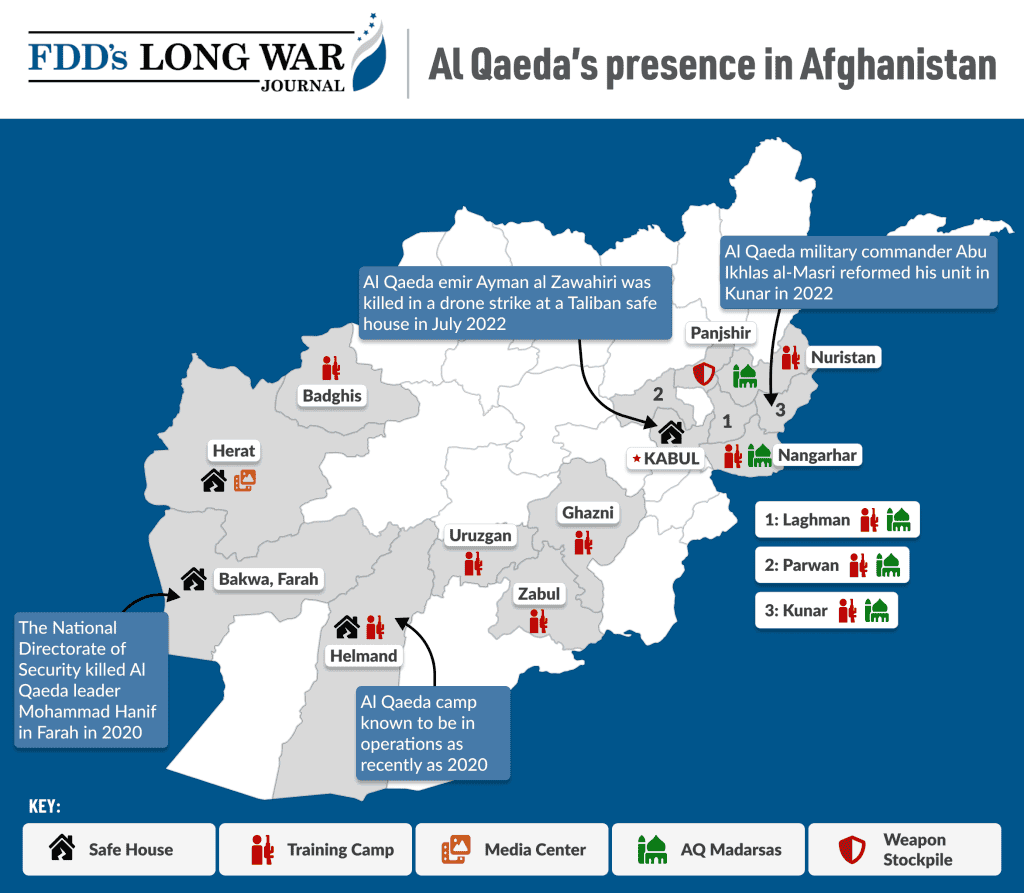
Zalmay Khalilzad, the former Special Repressive for Afghanistan Reconciliation and the key architect of the Doha Agreement which aided the Taliban’s takeover of Afghanistan, claimed that Al Qaeda’s branch in Afghanistan “doesn’t exist anymore” during his closed-door interview with the House Committee on Foreign Affairs in Nov. 2023. Khalilzad’s interview also shed light on both the Trump and Biden administrations’ desire to withdraw from Afghanistan at all costs, their failure to understand the Taliban and its intent to manipulate negotiations to facilitate a U.S. withdrawal, as well as the United States’ unhealthy reliance on enemies and adversaries to achieve impossible foreign policy goals.
Khalizad was interviewed by the House Committee on Foreign Affairs on Nov. 8, 2023. The transcript of the interview was released on May 1, 2024.
“Al Qaeda in the Indian Subcontinent has been dismantled”
Since the U.S. withdrawal from Afghanistan in Aug. 2021, Khalilzad has maintained that “the Taliban are delivering on their commitment in the Doha Agreement to fight ISIS and prevent al-Qaida from using Afghan soil to threaten the security of the US and our allies.”
In his testimony on Nov. 8, 2023, Khalilzad maintained this position, and even claimed that Al Qaeda’s branch in Afghanistan, Pakistan and Central Asia “has been dismantled.”
“I have to say for the record, looking back, that Al Qaeda in the Indian Subcontinent has been dismantled,” Khalilzad told the committee when questioned about this article, Analysis: Al Qaeda continues to operate throughout Afghanistan, from FDD’s Long War Journal. “It doesn’t exist anymore, according to our intelligence, since the Taliban took over.”
Khalilzad’s position on Al Qaeda in the Indian Subcontinent’s demise is not supported by either the United Nations Security Council Analytical Support and Sanctions Monitoring Team or U.S. Central Command, which is responsible for Afghanistan.
Two recent reports from the UN Monitoring Team since the U.S withdrawal from Afghanistan have documented Al Qaeda’s grown infrastructure in the Taliban-controlled country.
On June 9, 2023, the Monitoring Team reported that Al Qaeda was operating training camps in Helmand, Zabul, Nangarhar, Nuristan, Badghis, and Kunar, or six of Afghanistan’s 34 provinces. Six months later on Jan. 29, 2024, the Monitoring Team reported that Al Qaeda opened camps in four additional provinces: Ghazni, Laghman, Parwan and Uruzgan. Additionally, the Monitoring Team reported that Al Qaeda was operating five madrasas, a weapons depot and safe houses in Afghanistan that are used to facilitate the movement of its members to and from Iran.
“The relationship between the Taliban and Al-Qaida remains close,” the Monitoring Team noted.
In his Nov. 8, 2023 testimony, Khalilzad dismissed the Monitoring Team’s report and questioned the nationality of Dian Triansyah Djani, at the time the chairman of the United Nations Security Council who signed off on the Monitoring Team’s report. Khalilzad insinuated that Djani and the staff of the Monitoring Team were not qualified to provide intelligence on Afghanistan. Djani is Indonesian. The Monitoring Team’s past reports have been highly accurate and the group is widely respected in the Counterterrorism field.
“Yeah, it’d be good to see his nationality and where he’s worked before and all the committee members that worked on it,” Khalizad said. “So I am not saying anything that I know as if this was not good or whatever, but I say I relied more on our intelligence and our own people.”
Khalilzad “relied more on” U.S. intelligence, which Khalilzad admitted in his testimony made serious analytical errors in underestimating the strength and intentions of the Taliban and overestimated the staying power and strength of the Afghan government and its security forces. FDD’s Long War Journal has documented numerous intelligence failures in Afghanistan with respect to the Taliban and Al Qaeda.
General Michael Kurilla, commander of U.S. Central Command, admitted in congressional testimony in March of 2024 that U.S. intelligence capabilities in Afghanistan are “challenged.”
“In Afghanistan, the reduction in collection, analytical resources, and Intelligence, Surveillance, Reconnaissance assets means our campaign against Al Qaeda and ISIS Khorasan is challenged; while we can see the broad contours of attack planning, we lack the granularity to see the complete threat picture,” Kurilla said.
In the same testimony, Kurilla noted that Al Qaeda remains in Afghanistan, contrary to what Khalilzad claimed. While Kurilla’s assessment is less dire than the Monitoring Team’s reports, he did not present Al Qaeda as a group that has been “dismantled” as Khalilzad claimed.
“Al Qaeda remnants remain in Afghanistan,” Kurilla said in his written testimony. “While the July 2022 death of Ayman al-Zawahiri set the group back, Al Qaeda desires to rebuild. Though this will take time, Al Qaeda remains a long-term threat to American interests and citizens as well as the homeland.”
There are no facts to support Khalilzad’s claim that the Taliban has aided in the dismantlement of Al Qaeda, nor did Khalilzad present any. Khalilzad even admitted that the presence of Ayman al Zawahiri in a safe house run by the Haqqani Network, arguably the most powerful and influential Taliban faction, in July 2021 is inexplicable. When asked to explain Zawahiri’s presence in Kabul, he only described it as a “violation, full and complete, and — yeah, that – yeah,” referring to a violation of the flawed Doha agreement that pulled the wool over everyone’s eyes, while he continued to falsify things that can be seen in plain sight.







